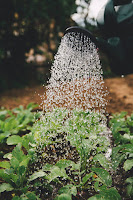This year was our first year digging into the dirt of farming, homesteading, and self-sufficiency. One of the major learning curves was learning how to speak the language of homesteaders! For this weeks tip Tuesday, we thought we would give you a glossary to always have at your disposal!
Annual: a plant that blooms, produces seed, and dies in one year.Aquaponics: combines raising fish and growing plants. They can produce both fish and plants for food.
Bolt: a plant that has gone to seed prematurely.
Chill hours: the number of hours vegetables and trees needs to be exposed to temperatures between 32 and 45 degrees. This is important to develop properly and to become productive.
Cold frame: season extender that is used to protect plants from frost.
Companion planting: planting seeds that are beneficial for each other instead of competing for resources.
Compost tea: brewed blend of organic matter to give your soil a boost toward optimum health.
Cover crop: plants grown in an area of your garden to help protect and rebuild the soil when the dirt is no longer in use.
Crop rotation: planting a specific crop in a different place from the previous garden season. This is to help rebuild nutrients in the soil.
Damping off: when your seedlings start to decay. This is usually because of soilborne diseases and overwatering.
Dead heading: removing spent flowers for aesthetics, prolong bloom, promote re-bloo, or prevent seeding.
Deep Shade: plant that needs less than 2 hours of dappled sun in one day.
Direct seed: to plant the seeds directly into the soil instead of starting indoors.
Hardening off: the safest process of moving plants from being indoors to being outdoors. Plants are slowly moved to the outside by increasing the periods of direct sunlight slowly until the plant is acclimated. Not doing this will cause your plant to face a period of stunted growth, or worse: die.
Heavy soil: soil made of lots of clay that poorly drains.
Humus: dark loamy earth.
Loam: soil composed mostly of sand, silt, and a small amount of clay.
Mulch: organic material spread over the surface to hold in moisture and control weeds. This is spread around the plants, not over them and usually only completed once the plant had germinated.
No-Till-Gardening: no cultivation after the initial; instead plant in mulch year after year. This is thought to save on labor and to eliminate weeds.
N-P-K: Nitrogen, phosphorus, potassium. The three most important nutrients for plants. Also known as macronutrients.
Organic: type of gardening using no chemicals, synthetic fertilizers, or pesticides.
Perennial: grows and flowers for multiple years.
Season extender: anything used to extend the growing seasons in both spring and fall. Allows for plants to be started slightly earlier or plants to produce later into the winter.
Soil amendment: material added directly in the soil to improve its properties.
Square foot gardening: practice of dividing the growing area into small square sections.
Succession planting: several planting methods that increase the amount of plants in a garden during one growing season by making use of space and timing.
Topdressing: adding an amendment after already planting a crop into the soil.
Vermicomposting: adding your food scraps to a worm farm for them to eat, digest, and create worm castings.
Worm castings: worm poop. They are considered the most nutrient dense organic compost available.
Are there any words that you think we missed? Let us know in the comments down below, or email us at peachieloufarms@gmail.com!
(opening photo credit: Photo by Markus Spiske on Unsplash)
Popular links: Home * Facebook * TikTok * Twitter * Privacy Policy * Terms and Conditions * About Us * email: peachieloufarms@gmail.com.

Comments
Post a Comment